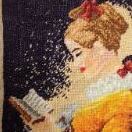LA LA LA LA LA HEY! ŁA ŁA ŁA ŁA ŁA HEJ!
-
Ostatnio w Warsztacie
-

Waldemar_Talar_Talar 12 498
@Ewelina - dzięki -
0
-
-
Najczęściej komentowane w ostatnich 7 dniach
-
- 18 odpowiedzi
- 271 wyświetleń
-
- 11 odpowiedzi
- 254 wyświetleń
-
rodowe
Przez Somalija, w Wiersze gotowe
- wyznanie rodowe
- najnowsze doniesienia o słowianach
- (i 1 więcej)
- 9 odpowiedzi
- 258 wyświetleń
-
- 9 odpowiedzi
- 240 wyświetleń
-
- 8 odpowiedzi
- 228 wyświetleń
-










Rekomendowane odpowiedzi
Jeśli chcesz dodać odpowiedź, zaloguj się lub zarejestruj nowe konto
Jedynie zarejestrowani użytkownicy mogą komentować zawartość tej strony.
Zarejestruj nowe konto
Załóż nowe konto. To bardzo proste!
Zarejestruj sięZaloguj się
Posiadasz już konto? Zaloguj się poniżej.
Zaloguj się